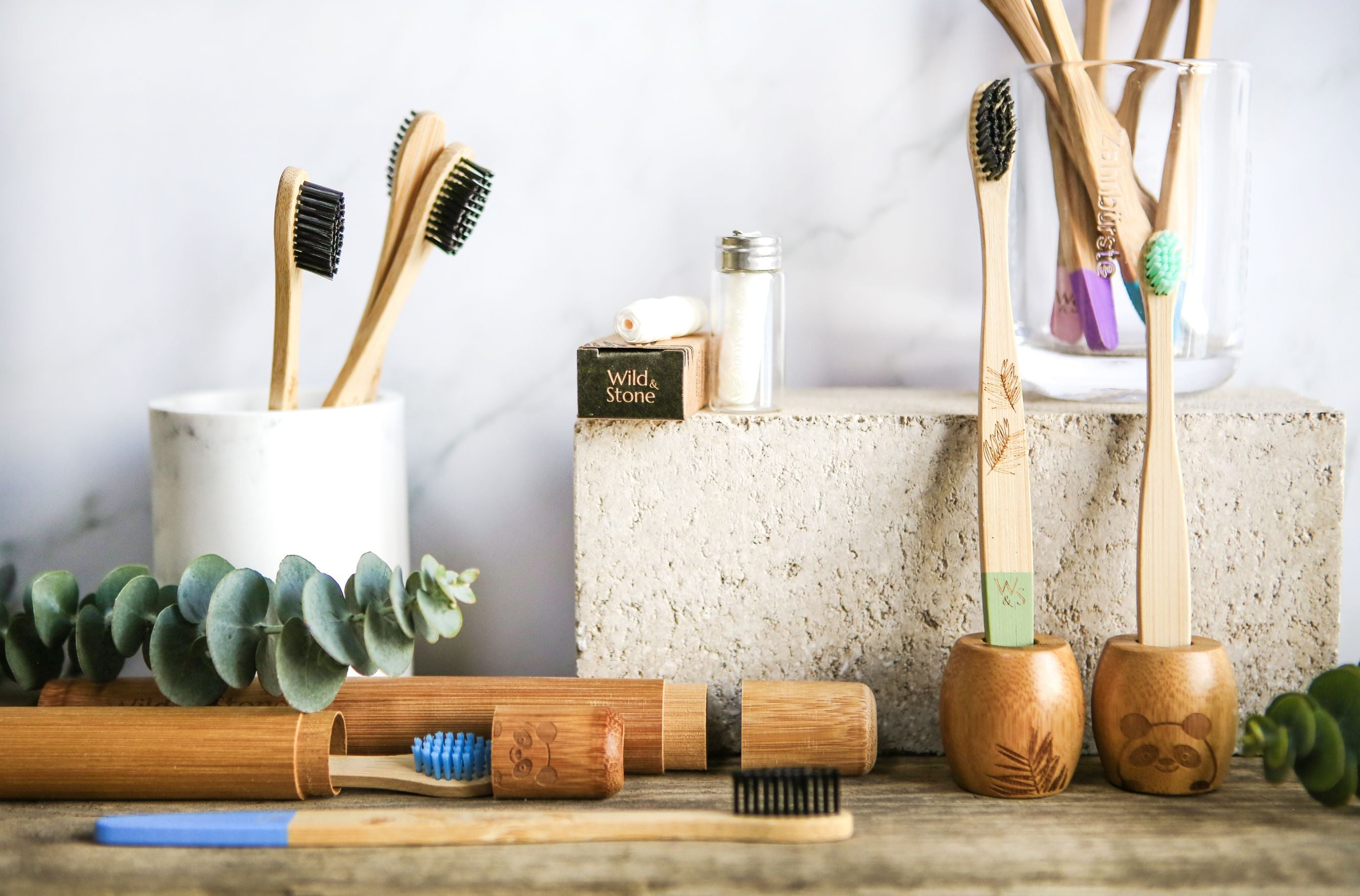Your Cart is Empty
INFO

Here’s How To Create A Sustainable Bathroom
April 13, 2021 4 min read
Why Create A Sustainable Bathroom?
Next to the kitchen, the bathroom is one of the most wasteful areas of the home, but it doesn’t have to be that way!
The bathroom is actually one of the simplest rooms to reduce your single-use plastic waste in, but unfortunately, only 50% of conventional hygiene products are being recycled, meaning up to 40% of our recyclable bathroom waste is going to landfill waste.
The zero-waste bathroom swaps you’ll be making are not only better for the environment, but are better for you because green brands prefer natural and organic materials.
Read on to discover five of the easiest and simplest zero waste bathroom swaps to help you along your low-waste journey.
The Top 5 Sustainable Bathroom Swaps
1. Ditch The Plastic Toothbrush
Switching to a bamboo toothbrush is one of the easiest sustainable bathroom swaps you can make.
In the UK, we throw away up to 264 million plastic toothbrushes per year! Worldwide that number climbs up to almost 30 billion toothbrushes. This calculates to 600 million kilograms of plastic waste each year going into landfills across the world.
We know plastic toothbrushes take up to 500 years to decompose, considering the fact that the toothbrush as we know it was only invented in the 1930s, which means every single toothbrush ever used is still on our planet today.
The alternative is a bamboo toothbrush. Bamboo is one of the fastest-growing plants on earth, meaning there is a sustainable supply of bamboo - and it’s also completely biodegradable, meaning that it can be composted or recycled at the end of its life! A great sustainable swap.

2. Get Minty Fresh, Sustainably
After you’ve treated yourself to a bamboo toothbrush, the next swap is the plastic toothpaste tube with a jarred toothpaste or toothpaste tabs, filled with natural, non-toxic ingredients.
Traditional toothpaste tubes create a lot of bathroom waste as they are made from sheets of plastic laminated, sealed around a layer of aluminium. This mixture makes it incredibly difficult to recycle through conventional methods, which means the tubes end up in landfills, taking hundreds of years to decompose, right next to the plastic toothbrush.
Dental floss is also bad for the environment, and similarly to toothbrushes it cannot be recycled so it sits in landfill for hundreds of years. As dental floss is made out of nylon, a non-biodegradable material, and is specifically designed not to tear, it can end up suffocating marine animals or makes its way into their stomachs. Learn more about dental floss and the environment here.
Swap out your usual toothpaste and floss for a more sustainable alternative whilst still keeping minty fresh breath. Bioplastic floss made from corn starch that can easily be composted, it’s coated in a natural candelilla wax coating alongside a natural mint flavouring.

3. Choose Reusable Cotton Rounds
You may struggle to find a bathroom without a stack of single-use cotton pads or make-up wipes, but these small pieces of cotton have devastating effects on our environment. Producing a single kilogram of cotton consumes, on average, 22,500 litres of water. This water cannot be used for anything else as it is often too contaminated for reuse.
To put that into perspective, in 2013, India produced 7.5 million bales of cotton using about 38 billion cubic metres of water; this amount of water could have met the daily use of 85% of India’s 1 billion-plus population.
The issue with cotton isn’t only its massive water use, it is one of the most pesticide-doused crops on our planet. The cotton pads you buy from the pharmacy are usually doused in this pesticide residue. Cotton also isn't biodegradable due to the bleaching and mixing process used to make rounds or wipes, meaning they stay on our earth for years on end.
If all of this wasn’t enough, they are also wrapped in plastic packaging which goes straight into landfill too.
The answer? Reusable cotton rounds. Grab yourself a pack of reusable cotton pads made from 100% organic cotton, which hasn’t been chemically treated or bleached.

4. Switch To Shampoo Bars
The average Brit will get through 242 plastic bottles per year, totalling 520 million shampoo bottles across the nation, which the majority of will be chucked into landfill without a second thought.
Shampoo bars are an ingenious solution to the problem of disposable plastic bottles, they are also compact, long-lasting, and are great for travel. You can also get conditioner bars to ensure your locks stay smooth.
For the low maintenance lovers out there, you can find 2-in-1 or 3-in-1 soap, shampoo, and conditioner bars for the ultimate low waste shower routine.
5. Shave Like They Did In The Olden Days
In 2018, around 5 and a half million people were using disposable razors, if they all follow the usual advice of 5-7 shaves before replacement, chucking their razors every 2 weeks, that would be 140 million disposable razors thrown away each year, and that’s just in the UK!
Stainless steel safety razors produce a much better shave than their plastic alternative, and they are designed to be used over the face and the body, with a grooved edge made for a precision wet shave that’s not only clean but gentle on the skin.
The sharp blade effortlessly banishes razor burns and ingrown hair as it easily cuts through hair, for a close, smooth, irritation-less shave.
Safety razors are also incredibly easy to recycle, just remove the razor, wipe off the residue, and place it into the metal recycling alongside your food cans.
It's so easy to make a difference to your bathroom waste by adopting these simple suggestions for a greener world.
Wild & Stone’s mission is to create stylish, easy to adopt and usable alternatives to common plastic products around the home. We source all our products sustainably, from raw material to final delivery. Shop our wide range today.
Send us your pictures of your sustainable bathroom ideas to hello@wildandstone.com or tag us on Instagram #wildandstone
Also in Sustainable Living Blog

How to Wash Tea Towels Properly: A Step-by-Step Guide
December 17, 2025 5 min read
Wash your tea towels properly with our step-by-step guide, from how often to wash to the best methods.

What Is the Most Eco-Friendly Way to Wash Dishes? A Guide
December 09, 2025 4 min read
Learn the most eco-friendly ways to wash your dishes in our guide to saving water and reducing waste.

6 Sustainable Living Tips for Busy People
December 08, 2025 4 min read
Discover our top 6 sustainable living tips for busy people here, making sustainability simple and achievable.
Make your inbox a little more eco!
Sign up and save 10% on your first order of 2 items or more.
Keep an eye on your inbox for the latest eco trends, articles, deals and product releases.


